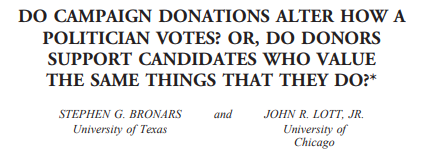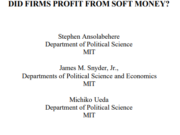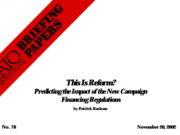Despite all the work on how campaign donations influence a politician’s behavior, the nagging question of whether contributions alter how a politician votes or whether these contributions constitute support for like-minded individuals remains unresolved. By combining past campaign contributions literature with work on politicians intrinsically valuing policy outcomes, the authors offer a simple test that examines how politicians’ voting patterns change when they retire and no longer face the threat of lost campaign contributions. If contributions are causing individual politicians to vote differently, there should be systematic changes in voting behavior when future contributions are eliminated. In contrast, if contributors donate to candidates who intrinsically value the same policies, there should be no changes in how a politician votes during the last period. After testing 661 congressmen, who served in the House of Representatives from 1977 to 1990, the authors strongly reject the notion that campaign contributions buy politicians’ votes. Their estimates demonstrate a remarkable degree of stability in voting patterns over time, thus lending support to past work emphasizing that it is costly for ideological politicians to alter their positions.
Do Campaign Donations Alter How a Politician Votes? Or, Do Donors Support Candidtes Who Value the Same Things that they Do?
October 1, 1997 • By IFS staff • Academic Research • First Amendment and Campaigns, Petition Rights, Political Spending














